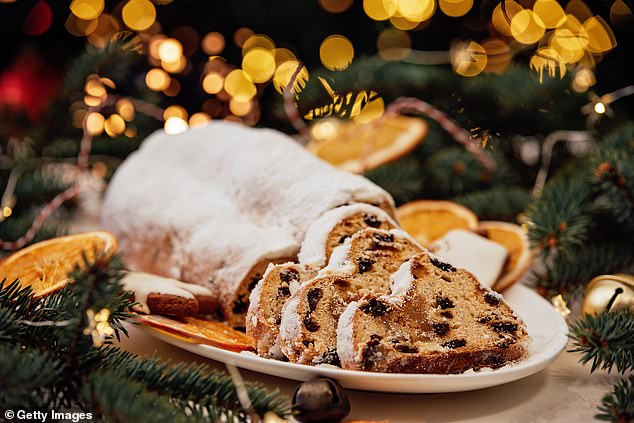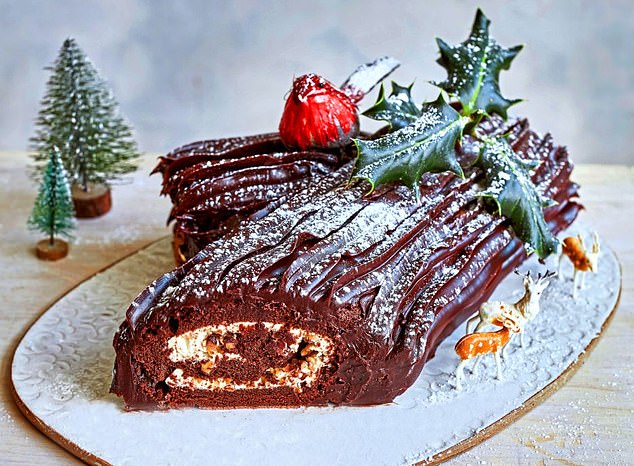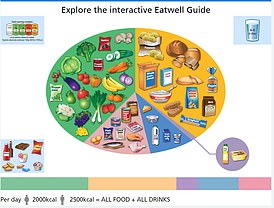The Christmas desserts on the nice list: Paul Hollywood’s stollen can ward off an early grave – but Prue Leith’s boozy chocolate log has the opposite effect, according to study of Great British Bake Off puds
Christmas puddings, yule logs and trifles will grace the tables of households across the country on December 25.
But while they are not usually known for their health benefits, scientists have said that consuming certain puds may protect against an early grave.
US researchers studied dozens of recipes on the Great British Bake Off website and examined the link between their ingredients and health effects.
Fruit, nuts and coffee had the strongest links to disease prevention, while those containing alcohol increased the risk of the opposite effect.
It meant that a recipe from presenter Paul Hollywood could reduce the risk of dying young because it contains lots of dried fruit and nuts, while Prue Leith's chocolate block, made with Irish cream liqueur, could increase the risk of premature death.
It meant that a recipe from presenter Paul Hollywood (left) could reduce the risk of dying young because it contains lots of dried fruit and nuts, while Prue Leith's chocolate block (right), made with Irish cream liqueur, could reduce the risk of premature death can increase.

Paul's stollen, made with dried fruit and marzipan, was linked to a reduced risk of death from ingredients such as almonds, dried fruit and milk (stock image)

However, Prue's Chocolate Yule Log, described as a Swiss roll 'subtly laced with Irish cream liqueur to heighten the festive mood', has been linked to an increased risk of liver cancer, stomach cancer and colon cancer because it contains alcohol (stock image)
Researchers from the Yale School of Medicine and Emory University noted that Christmas desserts have been eaten in Britain since the Middle Ages.
These puddings were 'actually quite healthy' and packed with plums, raisins, nuts, herbs and grains, they said.
However, people's tastes have evolved over time and festive desserts have become more decadent and sugar-laden, raising concerns that they are bad for health, the team wrote.
To find out whether modern sweet Christmas treats still retain the health benefits they were once associated with, they delved into 48 Christmas recipes. cakes, cookies, pastries, puddings and desserts on the baking show's website.
In total, they contained 178 ingredients that were split into 17 groups, including alcohol, chocolate, eggs, fruit, nuts and coffee.
The scientists then examined the links between these ingredient groups and the risk of death, according to previous research.
Results, published in the Christmas issue of the BMJ44 studies found a link between eating fruit and avoiding an early grave.
Papers also provided evidence that coffee (17) nuts (14) reduce the risk of death.
However, there was also plenty of research warning that alcohol and sugar increased the risk of disease and death.
This means that desserts packed with fruit and nuts, such as Paul's stollen, made with dried fruit and marzipan, were linked to a reduced risk of death from ingredients such as almonds, dried fruit and milk.
The researchers wrote: 'All in all, without the eggs, butter and sugar, this dessert is essentially a fruit salad with nuts. Yum!'
However, Prue's chocolate yule log, described as a Swiss roll 'subtly laced with Irish cream liqueur to heighten the festive mood', has been linked to an increased risk of liver cancer, stomach cancer and colon cancer because it contains alcohol.
They concluded: 'The health benefits of most ingredients in The Great British Bake Off Christmas desserts outweigh the harms.
'That said, all Christmas desserts could be made even healthier by replacing alcohol with milk or coffee.'
The team noted that their study was only observational and that in many cases the alcohol content of baked goods evaporated in the oven. Furthermore, they did not take into account the amount of ingredient in each dessert.
They added that it is best to analyze the risk of food intake through a person's overall diet rather than each ingredient in a meal.
Health chiefs recommend consuming sweet treats in moderation to keep calorie and sugar intake in check.

